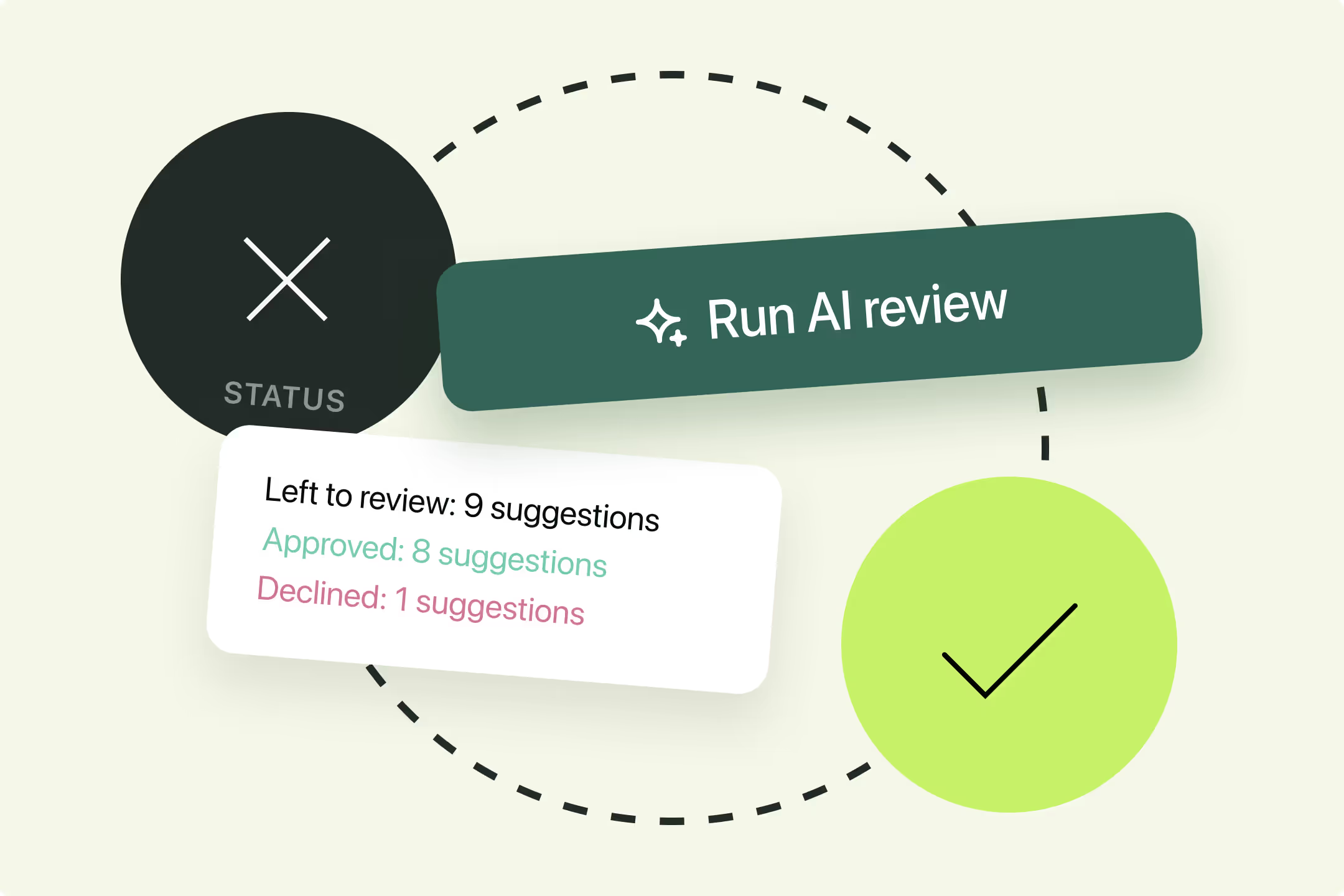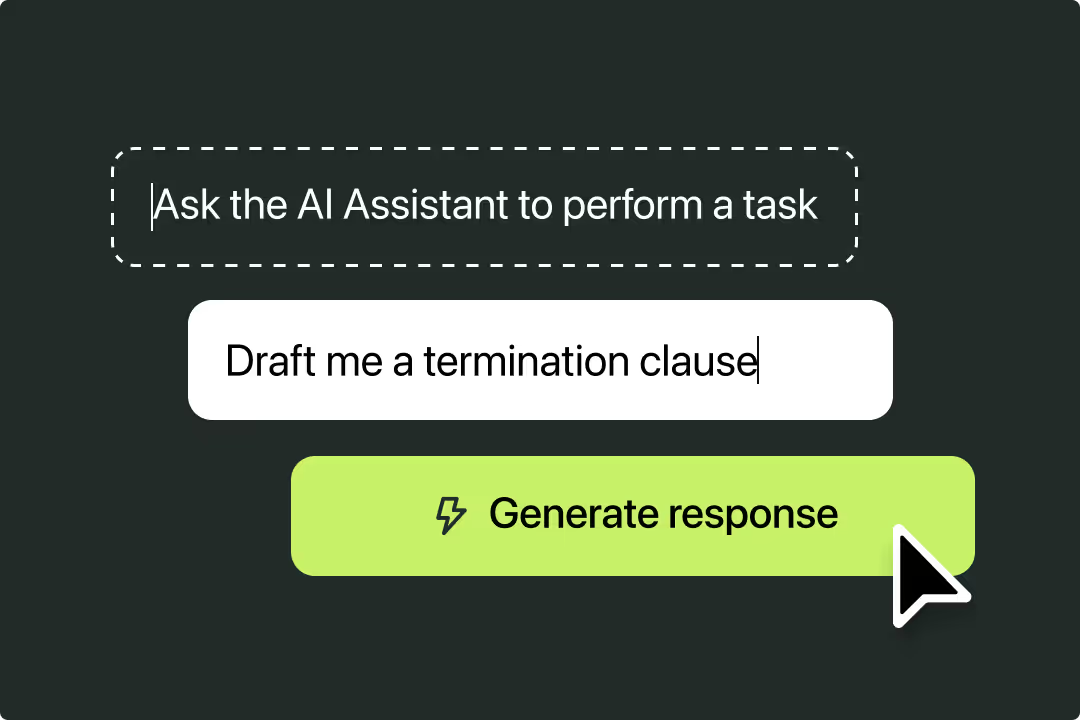Solutions
Customer Support
Resources
The legal industry is constantly moving forward, albeit sometimes slowly. But the need to create accurate and compliant legal documents has always been present - even when signing with a quill and ink.
Document automation software can streamline this process and enable businesses to work faster. But what is document automation software, what are its benefits, and which software should lawyers use to automate contracts in your business?
Legal document automation software automates some or all of the document generation process.
Traditionally, lawyers or legal professionals spend a significant portion of time drafting legal documents, like contracts, on Microsoft Word or another document generation tool. This software allows them to edit and review these documents, though often at the cost of collaboration.
Documents are then exported and stored on a computer or in the cloud. Not to mention the process of negotiating any legal contracts created this way. Sound complicated? It is.

Thankfully this manual process has been transformed by the advent of automation. Document automation software solves the friction associated with manual processes, by allowing users to collect data and generate documents automatically, usually based on rules that you set up in the software.
Although you can find AI document automation software as a standalone, many platforms offer document automation as part of a wider legal document workflow, like a Contract Lifecycle Management (CLM) tool.
With so many types of software now available, it can be confusing to know which is which.
Document management software is typically a central repository for storing, managing, and accessing documents online. Information can be organized and shared without the need for a large filing cabinet or countless emails.
Document automation software goes a step further than this by automating the entire document lifecycle, from creation and editing to storage and sharing. Document automation software exists to streamline internal processes and increase productivity.
There are so many benefits to adopting document automation software for your business, particularly if you’re an in-house lawyer interested in finding out how AI can enable your business to move faster.
A comprehensive document automation platform is essential for keeping track of important legal documents. Visibility is important when it comes to important legal documents, as they have often been created with a particular purpose in mind.
For example, if a VP of Sales wants to know how far their prospect has gone in negotiating a contract, they should be able to find this information out immediately. Missed renewals are another instance that benefits from a better tracking system, especially when it comes to contracts.

A software repository ensures that documents are not siloed on one computer or filing system. Instead, everybody who needs to have access to documents can do so easily. For example, automation systems that have a comprehensive contract repository are usually automated, which means you'll never have to manually update a spreadsheet with the relevant version or data again.
Instead, this information populates and refreshes automatically based on the values within your agreements. Automating this process saves time and minimizes mistakes, making the overall process of storing documents more efficient.
The greater the visibility of your documents, the more accurate these documents will be. Not only can you set information to populate fields automatically, but everybody is creating documents in the same place.
For example, using document automation software means you can create contracts from regularly updated templates. This increases accuracy, as everybody is generating agreements in the same way.
When it comes to contracts, negotiation can be a point of contention; this could be due to difficulties collaborating on contracts internally or with external counterparties.
Whether your practice area regularly deals with complex documents or more straightforward legal documents, it’s a win all around when contracts are finalized fast. A CMS like Juro has numerous document management features that streamline the negotiation process, from keeping track of version histories to redlining features.

Perhaps the most important feature of document automation software is the ability to create documents quickly and easily. This could mean having an NDA template available for sales teams to self-serve from, or access to an accessible editor to create an order form quickly.
However, many document automation software platforms charge by the amount of space used, which can get very expensive. A more holistic automation platform (like a CLM) may be necessary for those looking to manage complex legal documents, like vendor agreements.
{{quote1}}
In 2026, most things are digitized from sending emails and direct messages to an abundance of SaaS tools. Contacting and communicating with clients remotely is now the norm, the signing process must do the same.
A high-quality integration with an eSignature tool is therefore an essential part of the legal document automation process. It can also ensure a smooth contract management workflow for your business, as e-signature is often just one step in many.
Juro offers advanced electronic signature (AdES) as well as an integration with DocuSign if you prefer - find out more.
Certain aspects of this process should now look to generative AI to speed up processes, though this does come with the warning label that not all solutions are fit for purpose.
Let’s take contracting, for example. Juro’s AI assistant can help users draft, review, and summarize contracts up to 10x faster than traditional tools. This level of automation enables teams to turn around contracts up to 90% faster while keeping control.
If users were to do this using ChatGPT, they may be leaking valuable company data or breaking security measures set in place to protect people. If you’re thinking about using generative AI in your legal processes, make sure you research which solutions allow you to use AI responsibly.

If there’s one type of legal document needing automation, it’s contracts. Legal automation has the potential to solve many of the problems in-house legal teams face with their contracts today.
It could save in-house legal teams from all of the following:
If this sounds familiar and you’re looking for a way to automate your legal document admin without compromising security, control, and visibility, Juro could be the right platform for you.
Juro is a contract management platform that enables businesses to automate contract tasks and safely free up time for high-value work. You can find out more by hitting the button below.

Lorem ipsum dolor sit amet, consectetur adipiscing elit. Suspendisse varius enim in eros elementum tristique. Duis cursus, mi quis viverra ornare, eros dolor interdum nulla, ut commodo diam libero vitae erat. Aenean faucibus nibh et justo cursus id rutrum lorem imperdiet. Nunc ut sem vitae risus tristique posuere.

